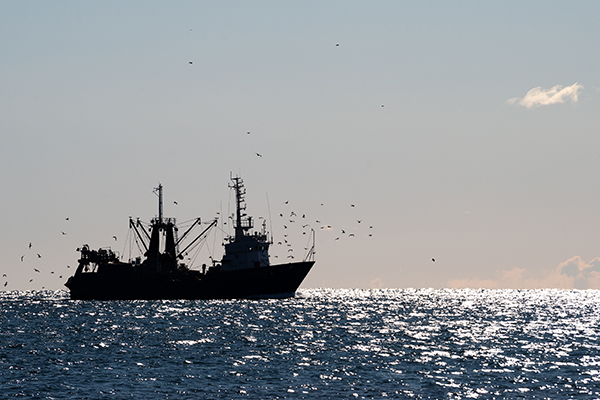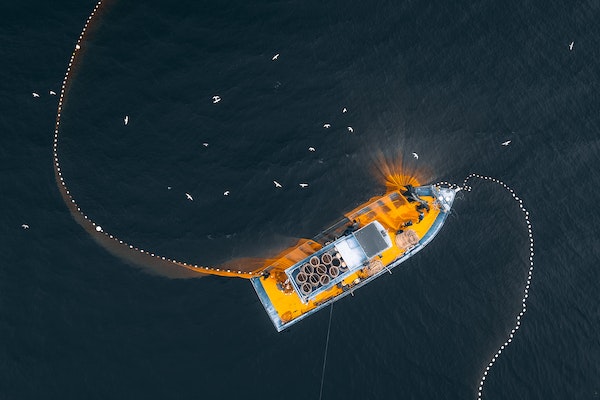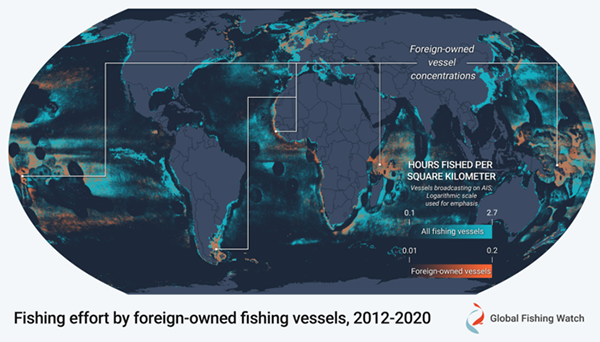IUU fishing activity has the potential to ‘evolve significantly’ with ocean warming

A new report is warning that ocean warming caused by climate change has the potential to intensify illegal, unreported and unregulated fishing (IUU) fishing and threaten global security.
The report, which was released by the leading defense and security think tank Royal United Services Institute (RUSI), offers a comprehensive global horizon scan that explores the impacts of climate change on IUU fishing over the next decade and beyond. The report concludes that there is potential for IUU fishing activity to “evolve significantly” in a warming world, with current patterns of operation already shifting as a result of climate change.
“Climate change has the potential to gradually alter interactions between humans and the aquatic environment,” wrote the report’s authors. “Fish is a key source of protein in human diets and shifts in sea temperature, salinity, weather systems and sea level have the potential to alter not only current patterns of distribution but also human patterns of (legal and illegal) fishing, processing and consumption.”
As fish populations and distributions shift in a warming climate, IUU fishing actors may be forced to adapt, altering their way of working. Moreover, where livelihoods and food security are affected by climate change, fishers engaging in legitimate practices may be driven into IUU activity.
The effects of climate change on fish stocks could affect yields and fishing-dependent livelihoods while rising temperatures and sea levels could affect human migration to and from coastal areas, the viability of fisheries infrastructure and the nature of IUU fishing dynamics.
On the dark side: How technology helps to expose potential IUU fishing on the deep sea
At the same time, global seafood consumption is predicted to continue to grow, having risen at more than twice the rate of population growth since the 1960s.
The report also highlights that climate change could “challenge existing governance frameworks, cooperative mechanisms and enforcement models, as well as presenting potential opportunities for national and global efforts to combat IUU fishing.”
“The need to anticipate these issues is pressing,” wrote the authors. “Globally, the impact of climate change on aquatic species is already being felt. Some species, depending on their mobility and habitat connection, are responding by shifting their distributions poleward and to deeper waters. Although some species are predicted to respond positively, there are indications that future changes in water temperatures could have a negative impact on many aquatic species.”
Follow the Advocate on Twitter @GSA_Advocate
Now that you've reached the end of the article ...
… please consider supporting GSA’s mission to advance responsible seafood practices through education, advocacy and third-party assurances. The Advocate aims to document the evolution of responsible seafood practices and share the expansive knowledge of our vast network of contributors.
By becoming a Global Seafood Alliance member, you’re ensuring that all of the pre-competitive work we do through member benefits, resources and events can continue. Individual membership costs just $50 a year.
Not a GSA member? Join us.
Author
Tagged With
Related Posts

Fisheries
Study indicates that IUU fishing makes fishers’ jobs even more dangerous
Commercial fishing has long been one of the most dangerous jobs, and a new study suggests IUU fishing, overfishing and climate change are making it worse.

Fisheries
GPS data may identify potential IUU fishing behavior
A study led by Global Fishing Watch provides new insight into potential IUU fishing behavior that could help improve fisheries management.

Fisheries
Global analysis of where fishing vessel tracking devices are disabled provides insights into IUU fishing
A new dataset of intentional disabling of identification devices by fishing vessels provides new insights into IUU fishing activities.

Intelligence
‘Through science, there’s no question’: How evidence-based transparency is changing seafood traceability
ORIVO, a science-based testing and certification service for the global feed and supplement industry, aims to change seafood traceability.



